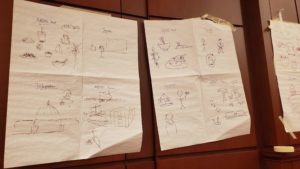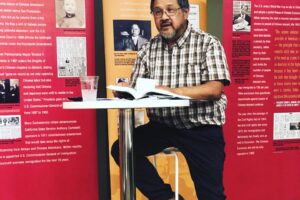On June 19th, our 1882 interns attended the Conference of Asian Pacific American Leadership (CAPAL) Washington Leadership Program‘s second session, a panel entitled “Knowledge is Access is Power“. The panel featured three speakers, all activists engaged with issues of minority empowerment and access to educational opportunities.
The program began with a brief activity, where participants were asked to group up and illustrate simple drawings of what they imagined when they were given a few key terms: “Asian-American Native Hawaiian Pacific Islander (AANHPI) food”, “AANHPI history”, “teacher”, and “policy-maker”. When shared, many of the drawings shared a few common themes. “Food” and “history” were more specifically culturally themed, while terms like “teacher” and “policy-maker” tended towards more traditional depictions that didn’t necessarily express the AANHPI experience. The activity served to open up a conversation and introduce an important question: why was there such a traditional mindset surrounding policy-makers and those in political positions? How can the gap between the AANHPI experience and positions of power be closed?

The panel began broadly, asking participants to consider what “power” is in an educational context. Katrina Breese, a panelist representing the organization APIA Scholars, argued that power for underprivileged groups takes the form of “decision-making capability,” specifically citing her own experiences in situations where she was denied autonomy due to problems of inaccessibility – by economic status, racial identity, among others – and how returning power to underprivileged AANHPI youth became a part of her mission.
The panel addressed two major facets that are key to building a successful system of access tailored to the AANHPI experience: emotional and cultural rapport, and economic mobility to education. Panelist Neel Saxena, executive director of Asian American LEAD, explained how developing structures of connectivity and collective strength in AANHPI communities is key to self-understanding and moving towards a culture of advocacy that is self-sustaining and cyclical. Saxena also detailed how while AANHPI-specific , the field is still in need of new paths, and visionaries to forge them. The panel also addressed a call for student activism, exploring how opportunities beyond a university setting could be brought back to that environment to serve both communities more broadly.
From a more personal perspective, I was particularly moved by the overall theme and message of the panel. While access to education is an area that I’ve been given power, access to education regarding AANHPI-specific topics and issues is a field of study that I believe is neglected. While the event was centered around AANHPI issues, the panelists also reminded us that problems in education policy affect all ethnic groups, and both advocates and community organizers must practice “data desegregation”, where law and policy fight for everyone. I also resonated with Saxena’s comment that activism does not ask “who has more needs”, but instead seeks to fight the “divide and conquer” approach to the intersection of education and minority rights.
The CAPAL Washington Leadership Program website can be found here.



